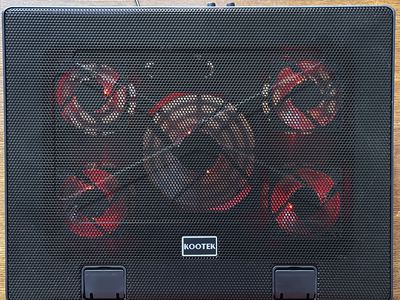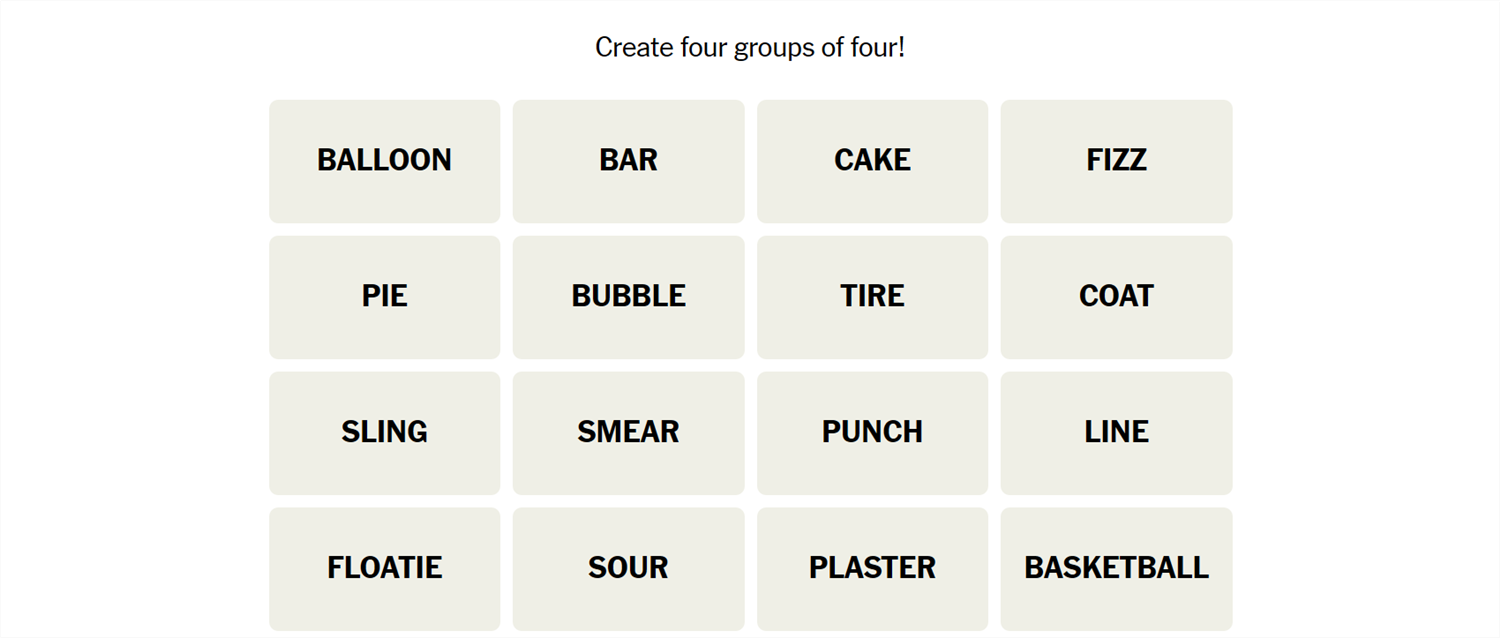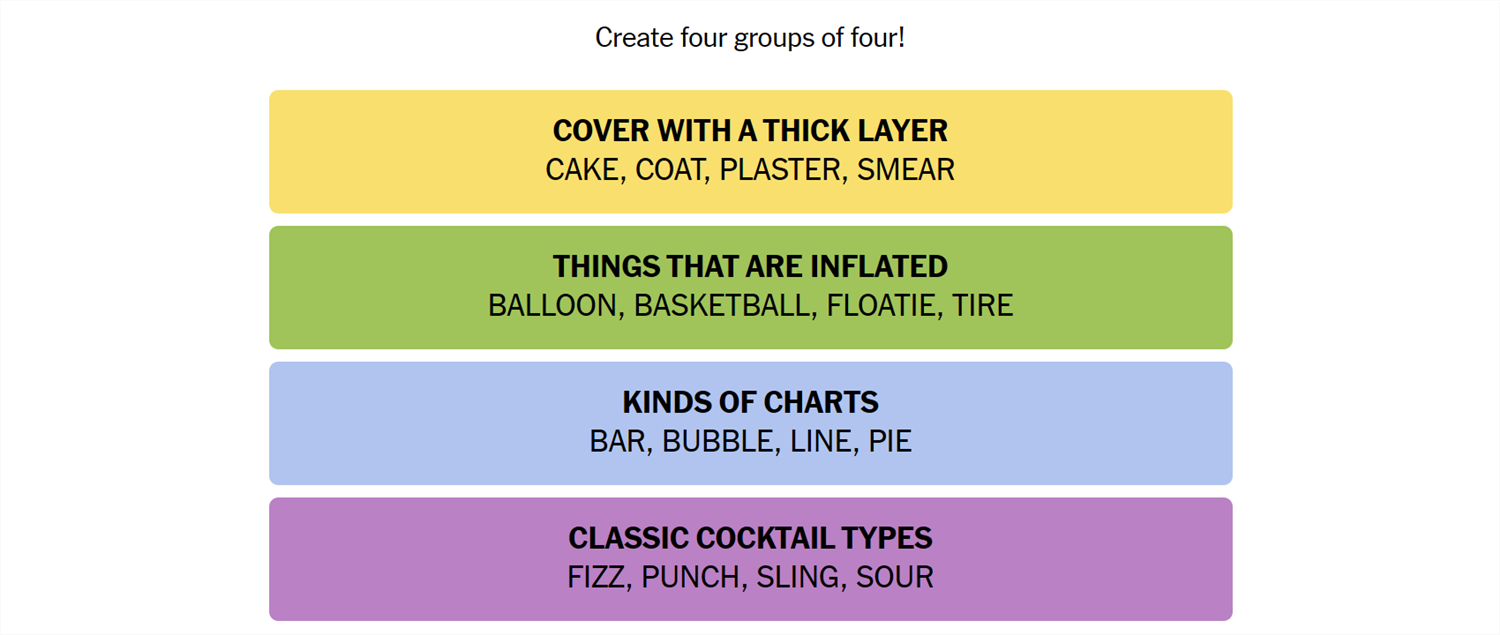
August 21 New York Times Connection Insights & Solutions: Unraveling the Mysteries of #437

August 21 New York Times Connection Insights & Solutions: Unraveling the Mysteries of #437
Connections is a game from the New York Times that challenges you to find the association between words. It sounds easy, but it isn’t—Connections categories can be almost anything, and they’re usually quite specific. If you need a hand getting the answers, we’ve got you covered.
What Is Connections?
Connections is a game from the New York Times. The objective is simple: sort 16 words into groups of 4. Each group of words will be connected by some common idea or theme. That common element could be anything. We have seen everything from games that rely on the number of letters in the words to categories that require you to spot an extra letter at the end of the word. Sometimes they’re references to economics, other times they reference fairy tales. There is no telling what sort of association there will be between words.
Once you’re confident you understand the connection, select 4 words, then hit “Submit.” You have only four attempts in total, so don’t be too guess-happy.
Hints for Today’s Connections Groups
Here are a few hints for the 437th Connections game to get you started:
- Yellow: Also slather or lather.
- Green: Soccer balls, foot balls, and some swimming pools.
- Blue: Includes histograms or box and whiskers.
- Purple: Alcoholic beverages.

If you still need help, the actual group names are:
- Yellow: Cover with a Thick Layer
- Green: Things That Are Inflated
- Blue: Kinds of Charts
- Purple: Classic Cocktail Types
Today’s NYT Connections Answers

Cover with a Thick Layer (Yellow):
Cake, Coat, Plaster, Smear
Things That Are Inflated (Green):
Balloon, Basketball, Floatie, Tire
Kinds of Charts (Blue):
Bar, Bubble, Line, Pie
Classic Cocktail Types (Purple):
Fizz, Punch, Sling, Sour
How Did We Solve This Connections Game?
Today’s game was unexpectedly difficult for me, though there wasn’t anything particularly difficult about the words or groups.
The first words I noted were bar and line, which made me think about different sorts of graphs. The only other words that could match that were bubble and pie. Together, they were in the Blue group, “Kinds of Charts.”
Cake threw me off horribly, and it took me entirely too long to realize that it was used like “caked on mud” rather than “I ate the entire cake in 2 minutes.” Once I realized my mistake, coat, plaster, and smear were a bit more obvious. They were in the Yellow group, which was “Cover with a Thick Layer.”
Balloon, basketball, floatie, and tire are all things you put air in, and it seemed like a reasonable category. Green was “Things That Are Inflated.”
That left fizz, punch, sling, and sour. Fizz and punch made me think of drinks, but I couldn’t connect sling to them at all. Luckily, I didn’t need to. Purple was “Classic Cocktail Types.”
How Do You Guess Connections Groups?
There is no quick, reliable way to approach Connections like there is with Wordle, since Connections isn’t algorithmic. However, there are a few things to keep in mind that can help.
- Look for similar parts of speech. Are some words verbs and others nouns? Are some adjectives? Try mentally grouping them based on those categories and see if any other patterns jump out at you.
- Are the words synonyms? Sometimes categories will just be synonyms for a phrase, or very close to synonyms. Don’t rely too closely on this, though. Occasionally, Connections will deliberately throw in words that are sometimes synonyms to mislead you.
- Try saying the words. Sometimes, saying the words helps. One puzzle we saw included the words go, rate, faster, clip, pace, speed, move, commute, and hurry—all of which are obviously related to the idea of motion. However, when you say them, it becomes a little more obvious that only four (go, move, hurry, faster) are things you’d actually say to prompt someone to get moving.
- Expect the red herring . Connections usually has words that could be plausibly, yet incorrectly, grouped together. Take the words Bud, Corona, and Light, as an example. You might instinctively see those three words together and assume they’re lumped together in a category related to beer—but they weren’t.
- Look for distinct words. If a word on your board doesn’t have multiple meanings or can really only be used in one context, try using that word as the basis for a category.
- Shuffle the board. Sometimes, moving words around will help you look at them in new ways.
If you didn’t solve this one, don’t feel too bad—there’s always tomorrow! And those words may align with a topic you’re interested in, giving you a leg up on the competition.
Also read:
- 2024 Approved Boost Your Productivity Mastering Mac's Screen Record with Shortcuts
- Free Conversion of 3GPP Files to Cu3gp Format - Online with Movavi
- Free Conversion: Change M4V Files Into 3GP Format Using Web Tools - Movavi Guide
- Free Online SWF to GIF Converter - Easy and Reliable by Movavi
- Is Accessing ChatGPT Compatible With Virtual Private Networks? Find Out Here
- Joint Music Journeys: Mastering Friend-Friendly Features of Spotify
- Mova's Web上にあるフリーMOV to AVI変換ツール - シームレスな翻訳
- Navigating the Path of Adobe Presenter Video Creation
- Online Kostenloos Bewerken Van 3GPP Naar WMV Door Movavi: De Windeklading Voor Proficiënten
- Resolving iPhone's Final Line Unavailable Issue: A Step-by-Step Guide
- Resolving Printer Driver Problems in Windows 11: A Comprehensive Guide
- The Commercial Viability of Creative Video Content
- Top Videokwaliteit Verhoven - De Best Prestatie Softwares
- Transform Your Workstation With Ergotopic's Superior Anti-Fatigue Mat, The Essential Addition to Any Standing Desk Setup
- Title: August 21 New York Times Connection Insights & Solutions: Unraveling the Mysteries of #437
- Author: Christopher
- Created at : 2024-12-27 22:07:58
- Updated at : 2025-01-02 23:23:18
- Link: https://some-approaches.techidaily.com/august-21-new-york-times-connection-insights-and-solutions-unraveling-the-mysteries-of-437/
- License: This work is licensed under CC BY-NC-SA 4.0.